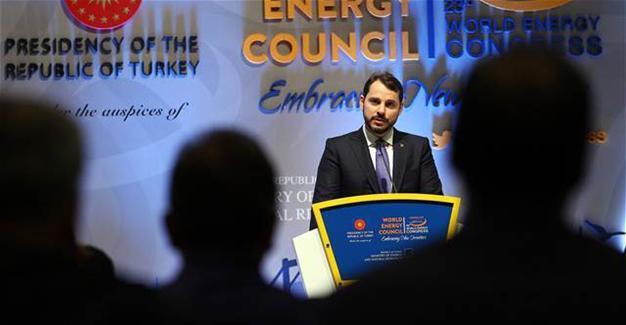World Energy Congress starts in Istanbul
ISTANBUL

AA Photo
The 23rd World Energy Congress 2016, which will bring together more than 10,000 participants from 85 countries, including 250 ministers and top decision-makers in energy, started in Istanbul on Oct. 9.The congress, which is being co-hosted by Prime Minister Binali Yıldırım and Energy Minister Berat Albayrak, and held under the auspices of President Recep Tayyip Erdoğan, will end on Oct. 13.
The congress will witness exchanges among policymakers from several countries central to the energy field.
Russian President Vladimir Putin will also attend the event following an invitation from his Turkish counterpart.
In an opening speech on Oct. 9, Albayrak said a total of 265 top speakers would discuss over 65 topics in total at the four-day event.
“We hope that the congress will open new horizons in the scope of the ‘Energy for Peace’ motto with the contribution of all participants,” he added.
Along with Maros Sefcovic, the European Commission’s vice president for the energy union, and Saudi Energy, Industry and Mineral Resources Minister Khalid El-Falih, Russian Energy Minister Alexander Novak and energy, environment, economy and industry ministers from 54 countries, including Iran, Saudi Arabia, Iraq, the United Arab Emirates, Jordan, Venezuela, Germany, Switzerland, Bulgaria, Algeria, Nigeria, Sudan, Ethiopia, Tanzania, Argentina, Bolivia and Uruguay, among others, will convene at the congress to steer the global energy agenda, Anadolu Agency reported.
Top executives of more than 250 energy giants, from Russia’s Gazprom and Saudi Aramco to BP, Royal Dutch Shell and SOCAR, will attend the congress, Anadolu Agency reported.
Under the theme “Embracing New Frontiers,” the congress program will lead delegates through the current and critical issues facing the energy industry.
The four-day program will open with a focus on future visions for the global energy industry. Day two will focus on business opportunities and resource management, as well as responses to new challenges of adaptation and innovation to ensure a secure, reliable energy system. Day three will lead with discussions of policy implications, with sessions designed to address the necessary institutional change to balance the World Energy Trilemma – energy security, energy equity and environmental sustainability.
The final day will be dedicated to Africa, with sessions exploring critical drivers and innovations working to secure a sustainable energy future for the region.
















